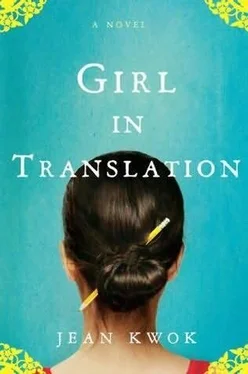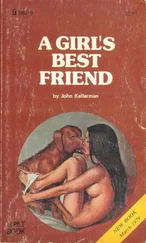“Come up,” she called. “You can close the door now.”
I felt my limbs loosen as if they’d been deflated. I ran up the stairs to see our new apartment.
“Don’t brush against anything,” Ma said.
I was standing in the kitchen. The wind whistled through the two windows on the wall to the right of me, and I wondered why Ma had opened them. Then I saw that they were still closed. It was only that most of the windowpanes were missing or cracked, with filthy shards of glass protruding from the wooden frame. A thick layer of dust covered the small kitchen table and wide sink, which was white and pitted. As I walked, I tried to avoid the brittle bodies of the dead roaches scattered here and there. They were huge, the thick legs delineated by the harsh shadows.
The bathroom was in the kitchen and its door directly faced the stove, which any child knows is terrible feng shui. A section of the dark yellow linoleum floor near the sink and refrigerator had been torn away, revealing the misshapen floorboards underneath. The walls were cracked, bulging in places as if they had swallowed something, and in some spots, the paint layer had flaked off altogether, exposing the bare plaster like flesh under the skin.
The kitchen was attached to one other room, with no door in between. Out of the corner of my eye, I saw a scattering of brown slowly recede into the walls as we walked into the next room: live roaches. There could also be rats and mice hiding in the walls. I took Ma’s broom, which she was still holding, inverted it and slammed the handle hard against the floor.
“Ah-Kim,” Ma said, “you’ll disturb the neighbors.”
I stopped banging and said nothing, even though I suspected we were the only tenants in the building.
The windows of this room faced the street, and their windowpanes were intact. I realized that Aunt Paula would have fixed the ones that other people could see. Despite its bareness, this room stank of old sweat. In the corner, a double mattress lay on the floor. It had blue and green stripes and was stained. There was also a low coffee table with one leg that didn’t match, on which I would later do my homework, and a dresser that was shedding its lime paint like dandruff. That was all.
What Aunt Paula had said couldn’t be true, I thought, no one has lived in this apartment for a long time. I realized the truth. She’d done it all on purpose: letting us move on a weekday instead of during the weekend, giving us the presents at the last moment. She wanted to drop us here and have the factory as an excuse to leave fast, to get out when we were still thanking her for her kindness. Aunt Paula wasn’t going to help us. We were alone.
I hugged myself with my arms. “Ma, I want to go home,” I said.
Ma bent down and touched her forehead to mine. She could hardly bring herself to smile but her eyes were intense. “It will be all right. You and me, mother and cub.” The two of us as a family.
But what Ma really thought of it all, I didn’t know: Ma, who wiped off all the cups and chopsticks in a restaurant with her napkin whenever we went out because she wasn’t sure they were clean enough. For Ma too, something must have been exposed in her relationship with Aunt Paula when she saw the apartment, something naked and throbbing under the skin of polite talk.
In our first week in the U.S., Ma and I had stayed in the short, square house of my aunt Paula and her family on Staten Island. The night we arrived from Hong Kong it was cold outside, and the heated air inside the house felt dry in my throat. Ma hadn’t seen Aunt Paula, her oldest sister, in thirteen years, not since Aunt Paula left Hong Kong to marry Uncle Bob, who had moved to America as a child. I’d been told about the big factory Uncle Bob managed and always wondered why such a rich man would have had to go back to Hong Kong to find a wife. Now I saw the way that he leaned on his walking stick to get around and understood that there was something wrong with his leg.
“Ma, can we eat now?” My cousin Nelson’s Chinese was awkward, the tones not quite right. He must have been told to speak the language because of us.
“Soon. Give your cousin a kiss first. Welcome her to America,” Aunt Paula said. She took three-year-old Godfrey’s hand and nudged Nelson toward me. Nelson was eleven years old like me, and I’d been told he would become my closest friend here. I studied him: a fat boy with skinny legs.
Nelson rolled his eyes. “Welcome to America,” he said loudly for the adults’ benefit. He leaned in to pretend to kiss my cheek and said softly, “You’re a rake filled with dirt.” A stupid country bumpkin. This time, his tones were perfect.
I flashed my eyes at Ma, who had not heard. For a moment, I was stunned by his lack of manners. I felt a flush crawl up my neck, then I smiled and pretended to kiss him back. “At least I’m not a potato with incense sticks for legs,” I whispered.
The adults beamed.
We were given a tour. Ma had told me that in our new life in America, we would be living with Aunt Paula and taking care of Nelson and Godfrey. Their house seemed luxurious to me, with orange wall-to-wall carpeting instead of the plain concrete floors I was used to. Following the adults around the house, I saw how large Aunt Paula was, nearly the same height as her husband. Ma, thinner after her recent illness, seemed small and fragile by comparison, but it was hard to think too much about it. I’d never been allowed to walk on bare feet before and I was amazed by the prickly feel of the carpet.
Aunt Paula showed us all her furniture and a closet full of linens but what impressed me most was the hot water that came out of the taps. I’d never seen such a thing. In Hong Kong, the water was rationed. It was always cold and had to be boiled to make it drinkable.
Then Aunt Paula opened her cupboards to show us the shiny tins and pots inside. “We have some very fine white tea,” she said proudly. “The leaves unfurl to become as long as your finger. Very delicate aroma. Please, feel free to drink as much as you like. And here are the pans. Best-quality steel, wonderful for frying and steaming.”
When Ma and I woke from our night sleeping on the couches, Aunt Paula and Uncle Bob had left to take their kids to school and attend to their work managing the clothing factory, but a note said Aunt Paula would be home at noon to arrange things with us.
“Shall we try that special white tea?” I asked Ma.
Ma gestured at the counter. It was bare except for an old ceramic pot and a box of inexpensive green tea. “My heart stem, do you think that those things were left out by accident?”
I stared at the floor, embarrassed by my stupidity.
Ma continued. “It is not easy to understand Chinese. Certain things are not said directly. But we must not be annoyed by small things. Everyone has their faults.” She put her hand on my shoulder. When I looked up, her face was calm and she meant what she said. “Never forget, we owe Aunt Paula and Uncle Bob a great debt. Because they got us out of Hong Kong and brought us here to America, the Golden Mountain.”
I nodded. Every single kid at my old school had been openly envious when they heard we were moving to the U.S. It was difficult for anyone to escape from Hong Kong before its scheduled return from British to Communist Chinese rule in 1997. There was almost no way out in those days unless you were a woman, beautiful or charming enough to marry one of the Chinese American men who returned to Hong Kong in search of a wife. This was what Aunt Paula had done. And now, she had been kind enough to allow us to share in her good fortune.
When Aunt Paula returned to the house that first morning in America, she suggested that Ma and I join her at the kitchen table.
Читать дальше












